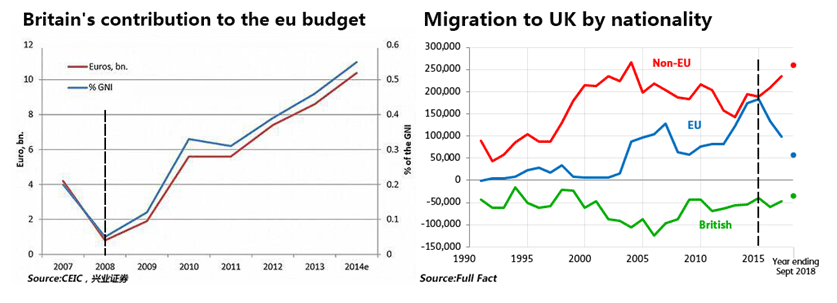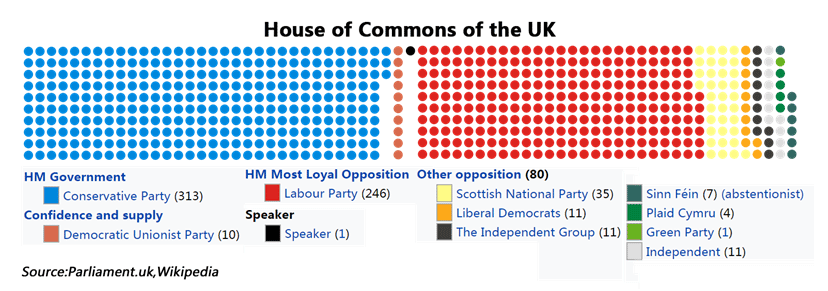The following article has been exclusively prepared for LeapRate by AETOS’ analyst Ryan Chen. Part I of the article can be found here.
Three Main Triggers

Ryan Chen
Apart from the long-term disagreement between Britain and the Europe, there are more practical causes to the Brexit, namely power, money and people, all very cliché factors.
According to media statistics, as of 2016 the EU has promulgated 454 laws on towels, 1,246 laws on bread and 12,653 on milk. Britain can do little about the crazy actions of the EU. According to foreign media, approximately 53% of the current laws and regulations in the UK stem from the EU, and approximately 70% of its laws are subject to EU laws. The British government feels handicapped by the complex rules of the EU.
Britain’s contributions soared after the financial crisis in 2008, when some eurozone countries could no longer afford the EU budget. By 2014, Britain’s contributions to the EU budget exceeded 10 billion euros, accounting for more than 0.5% of its gross national income (GNI), which triggered widespread discontent among the British public.
High unemployment in many European countries has also driven large numbers of migrants to Britain. Britain once saw a net immigration exceed 50% of the total net migration to the EU. These immigrants are biting into Britain’s low- and middle-income jobs and labor benefits, not to mention the strong opposition from British gentlemen after the refugee crisis broke out in 2015, in which case the EU sought to persuade Britain to accept millions of refugees.
By 2016, misjudging the situation, Mr. Cameron rolled out a referendum on leaving the European Union for the purpose of quelling discord and consolidating power, whereupon all the contradictions exploded.
The Internal and External Causes of the Delayed Brexit
Multiple causes shaped the stunning referendum in 2016. However, after almost three years the final Brexit plan is still being thrashed around the negotiating tables in Brussels and in the House of Commons. The Article 50 deadline for leaving the European Union has been repeatedly delayed, and the process of leaving the EU has evolved into the delayed Brexit.
Domestically, the UK is divided on Brexit. Opinions differ greatly from parties, even within the same party. After the beginning of the Brexit, a large number of senior cabinet officials in Theresa May‘s conservative party signed a joint petition to force her to leave office by threatening to resign or even leave the party. Interestingly, the largest opposition party–Labour–was also divided, with seven MPs leaving the party in a single day to protest against Jeremy Corbyn, the party leader. Additionally, the Scottish National Party (SNP), a stalwart Remainer, and the Democratic Unionist Party (DUP), Ms. May’s ally in Northern Ireland, kept making troubles out of concerns for their local interests.
Hard-line Brexit proponents accused Ms. May of being too weak in the negotiations, and they doubted whether she was resolved to leave. The Remain side organized a march of 650,000 people, calling for a second referendum. The government’s version of the Brexit deal was rejected three times, making it harder for the deal to be passed by the House of Commons. Moreover, the major parties’ proposed amendments to leave the European Union were repeatedly denied in the House of Commons. The only consensus reached by the parties was to postpone the Brexit deadline.
In short, the domestic situation has become a big headache for the authority.
Externally, Ireland and Northern Ireland (both part of Britain) feature intensive flow of people and commerce and trade. However, after Brexit the UK must–at least theoretically–let go of Ireland, which is a member of the European Union. Moreover, Britain and Ireland are both non-Schengen countries. Consequently, they can’t handle their border issues the way Norway and Sweden did. The crux is that, for historical and practical reasons, there is strong opposition from Ireland to the setting of a “hard border,” while in Britain the DUP has concerns that it would result in Northern Ireland seeking only a “semi-exit” out of the EU, which will affect its party interests. Despite the temporary guarantee agreement in regard to the Irish border issue, the essential part remains unresolved.
At the other end of table sat the European Union, which, after a long seesaw battle to reach an agreement with the British government, paid no more attention to Ms. May’s domestic problems. When Britain repeatedly showed its willingness to renegotiate, the EU was adamant that there would be neither a new round of talks nor a new deal. For the EU, having the UK leave the EU with a deal in the interests of the country will mean a good example for right-wing populist parties to follow. As populism continues to rise in Europe, it may be in the EU’s interest to make the bold Britain pay heavily for Brexit.
Additionally, Britain has long been viewed as America’s proxy in Europe. Thus, the success of Brexit will result in greatly enhanced effect of France and Germany. When the proposal of a “European army,” which was firmly rejected by London, is made anew, the relationship between the US and Europe may further deteriorate. Since the start of the Brexit process, US officials have generally stayed neutral. However, its freak President will never miss an opportunity to make trouble. While championing Brexit, he was busy criticizing the “soft Brexit” model, warning that Britain’s choice of a soft Brexit would kill the Anglo-American trade deal, regardless of the fact that the TTIP the U.S. and Europe have been negotiating since 2013 is aimed at the EU as a whole. After Brexit, it is a critical period for the UK and the US to shore up bilateral trade negotiations. Mr. Trump’s words, therefore, raise suspicion that he harbors an evil intention.
The process of Brexit involves the disputes between the British government and the House of Commons, partisan divisions, interest appeals of local parties, disputes left over from history on the Anglo-Irish border, wrestling between the UK and the EU, and populist issues. To make matters more complicated, the US President was fueling the fire with his inane remarks from across the Atlantic. It shouldn’t be puzzling that Brexit has progressed slowly, to the point that it’s now a “delayed Brexit.”
In conclusion, Brexit is fundamentally due to the defense of sovereignty under the influence of the values of pragmatism and egoism as well as the historical relationship between Britain and the Europe. Further, there are also realistic factors, such as the chronic unhappiness of British government with the EU laws and systems, and the dislike of the EU by British public due to the outbreak of the European debt crisis and refugee crisis. And after the Brexit referendum was passed, the British authorities were and are still trapped in numerous institutional constraints, partisan disputes and interests.
Disclaimer:
The information contained in this website is of general nature only and does not take into account your objectives, financial situation or needs. Please ensure that you read the Financial Services Guide (FSG), Product Disclosure Statement (PDS), and Terms and Conditions which can be obtained on our website https://www.aetoscg.com.au, and fully understand the risks involved before deciding to acquire any of the financial products listed on this website.
AETOS Capital Group Pty Ltd is registered in Australia (ACN 125 113 117; AFSL No. 313016) since 2007 and is a wholly owned subsidiary of AETOS Capital Group Holdings Ltd, carrying on a financial services business in Australia, limited to providing the financial services covered by the Australian financial services licence.
Trading margin FX and CFDs carries a high level of risk and may not be suitable for all investors. You are strongly recommended to seek independent financial advice before making any investment decisions.
This commentary is owned by AETOS, and copying, reproduction, redistribution and/publishing of this material for any purpose in whole or in part without the prior written consent of AETOS is prohibited.

